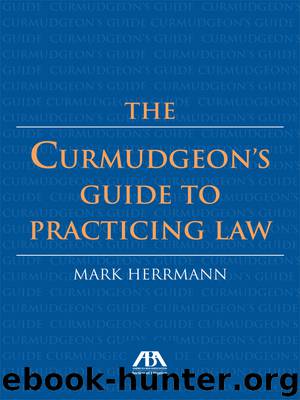The Curmudgeon's Guide to Practicing Law by Herrmann Mark

Author:Herrmann, Mark
Language: eng
Format: epub
Publisher: American Bar Association (NBN)
Published: 2006-11-16T16:00:00+00:00
A.
No.
What the heck does that mean? You didn’t learn anything. You didn’t establish the grounds for a dispositive motion, and the question cannot possibly be used for impeachment at trial. You wasted time, and you wasted your client’s money.
That question contained only a single negative. Even worse are questions that contain double negatives:
Q.
It’s not true that you did not respond, is it?
A.
No.
It’s a shame that they waste licenses to practice law on people who ask questions like this.
After you ask a question, insist on a responsive answer. When we have conversations in real life, we often do not answer each other’s questions. Somebody asks a question, somebody else comments on some related subject, and we move on. At deposition, witnesses often do this, sometimes intentionally and sometimes not. It is your job as the questioner to keep your question in mind, listen to the witness’s answer, assess whether or not the witness actually answered what you asked, and, if not, follow up appropriately. If you are not paying attention to this, it will not happen.
When you’re asking questions, be curious. When deposing a witness to learn facts, learn all of the relevant facts. If we learn only half of the facts, the unknown remaining ones are sure to be revealed to our dismay at trial. This means that you must be unnaturally curious when asking questions at a deposition. One way to be unnaturally curious is to think, as to every subject that you raise, whether you have asked the five Ws, the one H, and the one D: Who? What? When? Where? Why? How? And do any documents exist relating to that subject? If you keep the letters “WWWWWHDocs?” in mind as you take a deposition, you may make yourself more inquisitive and thus a better questioner.
Here are a couple of other thoughts on asking questions. First, do appropriate legal research before you take a deposition. Sometimes, one particular fact is very important to establish our client’s right to summary judgment. If that fact is important, read the leading cases in the field. Read the jury instruction on point. Think about, and write down in your notes—word for word—the perfectly phrased question that corresponds to the controlling authority. Then, if you ask that perfect question and get a “yes,” you can write a brief that says the leading case says that the issue that matters is X. In deposition, we asked X. The witness testified, “Yes.” The point-counterpoint of the controlling legal authority and the devastating deposition question and answer may be impressively persuasive. Those things don’t happen by chance; they happen as a result of careful preparation.
You can also sometimes elicit helpful testimony by causing a witness to speak the truth out of fear that documents might otherwise contradict him. For example, a prospectus for securities always contains a list of risk factors. Perhaps there is a risk factor that is critically important to your case, but was not actually identified in the opposing party’s prospectus. You might
Download
This site does not store any files on its server. We only index and link to content provided by other sites. Please contact the content providers to delete copyright contents if any and email us, we'll remove relevant links or contents immediately.
Working for Yourself by J.D. (Nolo) Stephen Fishman(1865)
Every Landlord's Legal Guide by Janet Portman & Stewart Marcia & Ralph Warner(1664)
Working for Yourself by Stephen Fishman J.D. (Nolo)(1525)
A Practical Guide to International Arbitration in London by Hilary Heilbron(1434)
Nolo's Essential Guide to Divorce by Emily Doskow(1420)
Plan Your Estate by Attorney Denis Clifford(1347)
Profit From Your Idea: How to Make Smart Licensing Deals by Attorney Richard Stim(1346)
Introduction to the study and practice of law in a nutshell by Kenney F. Hegland(1330)
Nolo's Encyclopedia of Everyday Law: Answers to Your Most Frequently Asked Legal Questions by Shae Irving & Nolo (Editor)(1325)
American Bar Association Guide to Wills and Estates by American Bar Association(1260)
How to Plan and Settle Estates by Edmund Fleming(1253)
Nolo's Encyclopedia of Everyday Law: Answers to Your Most Frequently Asked Legal Questions by Shae Irving; Nolo (Editor)(1235)
The Trademark Guide by Lee Wilson(1229)
American Bar Association Guide to Wills and Estates, Fourth Edition: An Interactive Guide to Preparing Your Wills, Estates, Trusts, and Taxes by American Bar Association(1218)
The Writer's Legal Guide by Tad Crawford(1212)
The Essential Executor's Handbook by David G. Hoffman(1155)
Limited Liability Companies For Dummies by Jennifer Reuting(1126)
Later-in-Life Lawyers: Tips for the Non-Traditional Law Student by Cooper Charles(1125)
9:41 by Iannuzzi John Nicholas;(1097)
